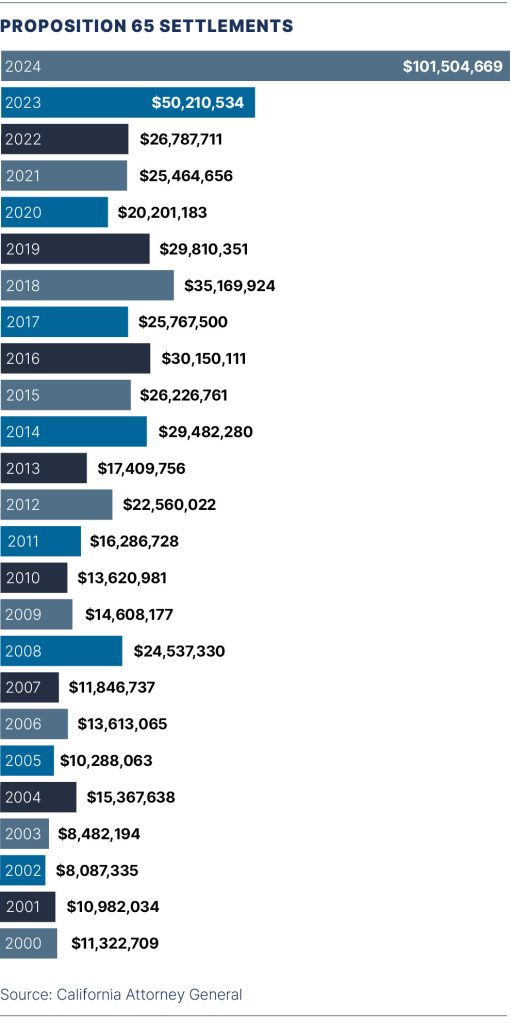
Proposition 65
CalChamber Backs Legislative, Regulatory, Judicial Efforts to Restore Law’s Original Intent
Proposition 65, the Safe Drinking Water and Toxic Enforcement Act of 1986, is the most far-reaching consumer “right to know” law in the nation. Proposition 65 requires California businesses with 10 or more employees to provide a clear and reasonable warning before knowingly and intentionally exposing individuals to chemicals known to cause cancer and/or reproductive toxicity. And contrary to centuries of Anglo-American law, Proposition 65 dispenses with the “innocent until proven guilty” legal maxim, thereby facilitating a growing bounty hunter environment where businesses must decide whether to defend costly lawsuits or settle.
 Unfortunately, the simple and supportable goals of Proposition 65 continue to be undermined by some attorneys who use the law for personal financial gain. Proposition 65 contains a private right of action, which allows private persons or organizations to bring actions against alleged violators of Proposition 65 “in the public interest.” This has led to the growth of a multimillion-dollar industry of “citizen enforcers” or “bounty hunters” who often enrich themselves by using the statute’s warning label requirements as an excuse to file 60-day notices and lawsuits to exact settlements under Prop 65’s unique legal regime that leaves a defendant “guilty until proven innocent.”
Unfortunately, the simple and supportable goals of Proposition 65 continue to be undermined by some attorneys who use the law for personal financial gain. Proposition 65 contains a private right of action, which allows private persons or organizations to bring actions against alleged violators of Proposition 65 “in the public interest.” This has led to the growth of a multimillion-dollar industry of “citizen enforcers” or “bounty hunters” who often enrich themselves by using the statute’s warning label requirements as an excuse to file 60-day notices and lawsuits to exact settlements under Prop 65’s unique legal regime that leaves a defendant “guilty until proven innocent.”Multitude of Lawsuits, Warnings
Rampant Proposition 65 “shakedown” lawsuits harm California consumers by driving up costs, creating confusion, and undermining the law’s original intent to protect public health. Businesses facing frivolous or excessive lawsuits must allocate significant resources to legal fees, settlements and compliance costs, which ultimately are passed on to consumers in the form of higher prices. This financial burden disproportionately affects small businesses, which struggle to absorb these costs and often have to limit product availability or raise prices even further.
Additionally, over-warning resulting from Proposition 65 misuse dilutes the effectiveness of the law. The proliferation of warning labels — many on products with negligible or no real risk — creates consumer fatigue and skepticism, reducing the impact of warnings on genuinely hazardous substances. Instead of empowering consumers to make informed decisions, this misuse confuses and misguides them, undermining the trust and credibility of Proposition 65. For the law to serve its intended purpose, reforms are needed to curb frivolous lawsuits and refocus its application on meaningful risks, ensuring genuine consumer protection without unnecessary economic harm.
CalChamber Sues California Attorney General
On behalf of its members, the California Chamber of Commerce filed a lawsuit on October 7, 2019 to stop the multitude of Proposition 65 warnings for the presence of acrylamide in food.
The lawsuit filed against then-Attorney General Xavier Becerra, who is responsible for enforcing Proposition 65, asks the U.S. District Court, Eastern District of California to stop the Attorney General and private enforcers from proceeding with Proposition 65 litigation over acrylamide in food.
CalChamber’s lawsuit seeks to limit this recent trend of shakedown lawsuits with regard to acrylamide that are exploiting Proposition 65 for financial gain, exacerbating over-warnings, and raising costs on food products in California. After CalChamber successfully secured a preliminary injunction by the Federal District Court, the case was appealed to the Ninth Circuit, where CalChamber again prevailed on the merits.
At the time of this article’s drafting, CalChamber is seeking Summary Judgment on the matter. If successful, the precedent established by this case could help pave the way for further changes to Proposition 65.
OEHHA Fundamentally Changes Short-Form Warnings
For years, the Office of Environmental Health Hazard Assessment (OEHHA) has proposed regulatory amendment packages often described by the agency as “merely clarifying existing law,” but which from the perspective of the business community, have often undermined existing protections provided for businesses.
Such was the case when on December 6, 2024, OEHHA fundamentally changed Proposition 65 regulations again under the guise of “clarifying amendments” to Article 6, Clear and Reasonable Warnings Short-Form Warnings. However, these “clarifying amendments” completely upended one of the most widely used and relied upon warning methods, known as “short-form warnings.” The regulatory changes adopted require all short-form warning labels to include at least one chemical name. For many businesses that relied on the prior regulations, that change will upend entire warning regime structures on products.
The CalChamber led a coalition of 119 organizations, representing tens of thousands of companies, opposing the agency’s major changes to Article 6 warning requirements on the basis that the proposed changes were not supported by substantial evidence, injected substantial confusion into the market, failed to consider reasonable alternatives, and imposed substantial financial burdens and additional litigation risks on businesses.
Although the business opposition did not stop the agency from making the changes, the coalition did persuade the agency to provide three years for businesses to make the updates to their warning programs, make explicit that short-form warnings may be used to provide safe harbor warnings for food products, and provide an additional 60-day transition period for retailers to update online short-form warnings after notice from a manufacturer.
California Proposition 65 Legislation
As originally adopted by California voters, Proposition 65 prohibits any amendments by the California Legislature unless such amendments are approved by a two-thirds majority in both the Senate and Assembly. Further, any amendment must “further the purposes” of Proposition 65. These twin limitations have prevented any serious efforts at reform for decades.
Despite the long odds, from time to time a Proposition 65 reform bill will be introduced, as was the case in 2024 when Assemblymember Mike Fong (D-Alhambra) introduced AB 3004. The bill sought to make modest changes to Proposition 65 by requiring additional notice and the factual information underlying the basis of the certificate of merit be provided to an alleged violator. The bill ultimately was held on the suspense file in its house of origin, again illustrating that legislative reform of Proposition 65 is illusory.
CalChamber Position
The CalChamber supports the underlying intent of Proposition 65, which is to ensure that consumers can make reasoned and informed choices when they purchase consumer products or enter certain establishments. Unfortunately, the intent of Proposition 65 has been undermined by ever-increasing attempts to use the law solely for profit, which has exploded into a multimillion-dollar cottage industry. For this reason, CalChamber ardently supports significant reforms to end frivolous, “shakedown” lawsuits, improve how the public is warned about dangerous chemicals, and strengthen the scientific basis for warning levels and initial listings.
Although achieving these goals legislatively has proven nearly impossible, CalChamber remains committed to initiating or supporting efforts to restore the original intent of the law. Whether proposed in the legislative or regulatory forum, or via changes through litigation, CalChamber will continue to lead the business community on this critically important issue to protect businesses from Proposition 65 abuses and to help restore Proposition 65 to its original intent of protecting California consumers.
February 2025
Agriculture and Resources
California Environmental Quality Act (CEQA)
Climate Change
Education
Energy
Environmental Regulation
Health Care
Housing and Land Use
Immigration Reform
International Trade
Labor and Employment
Legal Reform
Managing Employees
Privacy
Product Regulation
Taxation/Budget
Tourism
Transportation
Unemployment Insurance/Insurance
Water
Workers’ Compensation
Workplace Safety
Recent News
Product Regulation Bills
Court Cases
Regulations
- Summary: New Proposition 65 Warning Regulations (August 2, 2018)
- Proposition 65: Warning Regulations Synopsis (Adopted 8/30/2016)
- BPA Emergency Regulation Warning (Adopted 5/11/2016; In Effect Until 12/31/2017)
Reports
Coalitions
Committees
Staff Contact
 Adam Regele
Adam Regele
Vice President of Advocacy and Strategic Partnerships
Environmental Policy,
Housing and Land Use,
Product Regulation
